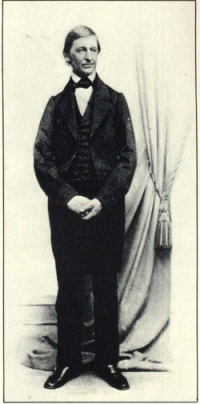AP
ENGLISH LANGUAGE AND COMPOSITION
MS.
GAMZON
TASK:
What are the central themes of American Transcendentalism? After reading
the writings of Emerson, Whitman, and Thoreau, write a SYNTHESIS essay of 5-7
pages that defines and explains the central themes of American
Transcendentalism. Support your discussion with evidence from the texts
you have read and annotated. What implications can you draw from these
readings that pertain to contemporary society?
DUE:
Friday, April 12
Be sure to:
1.
Write
an introduction that defines and explains the central themes of American
Transcendentalism.
2.
Be
sure to have a THESIS STATEMENT that connects a specific theme with a
contemporary issue.
3.
Develop
the body of your 5-7 page essay with text-specific quotes from your
readings.
4.
Quotes
of 3-4 lines should be included in the body text.
Quotes that are 5
lines or longer should be indented and single-spaced. This is called a block quote.
5.
Use
the SYNTHESIS of the ideas of your texts to support your own ideas and
writing. Use quotes appropriately and do
not make your paper “quote heavy.”
6.
Be
sure to cite the source of your quote (if you have page numbers) in MLA
format. If you are quoting from a
handout, cite the author and
essay. Ex. (Emerson, “Self-Reliance”) You can also refer to the source of your text
in an introductory clause (“As Emerson writes in “Self-Reliance,” ______________)
7.
Be
sure to include a WORKS CITED page in proper MLA format. This is NOT a bibliography. It is a WORKS CITED page.
8.
When
you have finished the paper, be sure to title it and center the title after
your MLA heading.
Synthesis means
putting ideas from many sources together in one essay or presentation. After
reading several books, watching movies and participating in a variety of class
activities, your task is to organize some of the information around a theme or
a question, make generalizations, and then present information (statistics,
quotes, examples) in a logical way to support your argument. Remind yourself
that a synthesis is NOT a summary, a comparison or a review.Rather a synthesis
is a result of an integration of what you heard/read
and your ability to use this learning to develop and support a key thesis or
argument.
Learning to write a
synthesis paper is a critical skill, crucial to organizing and presenting
information is academic and non-academic settings.
Content
Content
1.
Pick a topic from the list we put together or choose another topic that lends
itself to synthesis
2.
Develop a thesis. If you posed a question, present a tentative answer.Begin
your paper with the thesis, clearly outlining the ideas you will develop
3.
Identify at least three texts, which we read in this class and address
the theme and/or question you chose to focus on. Ideally you can find
references, which support your thesis.
4.
Read each of your sources carefully and summarize main ideas
5.
Analyze your sources to identify the similarities and differences or group
similar ideas together; generalize from these similar ideas
6.
Assemble the various generalizations in a logical and coherent way
7.
Focus on the ideas, not the authors of those ideas (your essay should not sound
like a list of unrelated ideas by unrelated people)
8.
It is highly recommended that you use direct quotes when referring to texts,
but make sure you situate your quotes and integrate them into the paper both in
terms of content and writing
9.
If your thesis/question lends itself to this, you can present and refute
arguments, which challenge it
10.
Whenever possible, make an effort to pepper your paper with real-world
examples, which support your overall argument
11.
In conclusion you should summarize your main thesis and outline questions,
which remain open or issues that ought to be further explored
Format
1.The length of your paper should be 5-7 typed double-spaced pages with reasonable margins.This does not include your bibliography (or works cited).
2.Be consistent in your use of bibliographic references;
include page numbers for quotes. List all works you cited at the end of
your paper
3.As you use quotations to support your ideas, make sure you
do not produce a paper of lengthy quotes strung together. If you quote three
lines or fewer, the quote should not be set off or indented but
integrated into the text of your paper.
4.Do not use first person.
5.Connect ideas using linking devices and transitions.
6.Spend time outlining, organizing and editing your paper. Ideally,
you can find someone else to proof-read your paper (your peer writing partner).
7.When you are done editing, think of a title, which best
captures your thesis.
Other sources:
http://condor.depaul.edu/dsimpson/awtech/amertran.html
http://howlandpowpak.neomin.org/powpak/cgi-bin/article_display_page.pl?id=thomas.williams/american&ar=20
http://www.enotes.com/transcendentalism/themes
Other sources:
http://condor.depaul.edu/dsimpson/awtech/amertran.html
http://howlandpowpak.neomin.org/powpak/cgi-bin/article_display_page.pl?id=thomas.williams/american&ar=20
http://www.enotes.com/transcendentalism/themes




